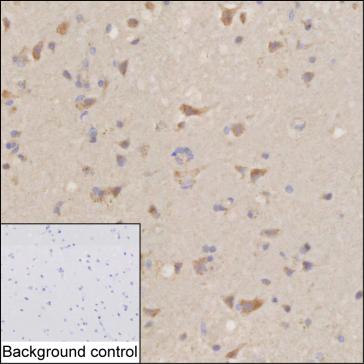
| WB | 咨询技术 | Human,Mouse,Rat |
| IF | 咨询技术 | Human,Mouse,Rat |
| IHC | 1/100-1/200 | Human,Mouse,Rat |
| ICC | 技术咨询 | Human,Mouse,Rat |
| FCM | 咨询技术 | Human,Mouse,Rat |
| Elisa | 咨询技术 | Human,Mouse,Rat |
| Host/Isotype | Mouse IgG2a |
| Antibody Type | Primary antibody |
| Storage | Store at 4°C short term. Aliquot and store at -20°C long term. Avoid freeze/thaw cycles. |
| Species Reactivity | Human |
| Immunogen | Purified recombinant fragment of human ARC |
| Formulation | Purified antibody in PBS with 0.05% sodium azide |
+ +
以下是关于ARC(Apoptosis Repressor with CARD)抗体的3篇参考文献及其摘要概述:
---
1. **文献名称**:*ARC regulates programmed necrosis and myocardial ischemia/reperfusion injury through the inhibition of mPTP opening*
**作者**:Meng L, et al.
**摘要**:本研究利用ARC抗体探究ARC蛋白在心肌缺血再灌注损伤中的作用,发现ARC通过抑制线粒体通透性转换孔(mPTP)的开放,减少心肌细胞程序性坏死,提示其作为心脏保护治疗的潜在靶点。
---
2. **文献名称**:*ARC, an inhibitor of apoptosis, is suppressed in β-cell models of diabetes*
**作者**:Johnson JD, et al.
**摘要**:通过ARC抗体检测发现,糖尿病β细胞模型中ARC表达显著下调,导致细胞凋亡增加。研究揭示了ARC在维持胰岛β细胞存活中的关键作用及其与糖尿病病理的关联。
---
3. **文献名称**:*The CARD domain of ARC mediates its interaction with caspase-8*
**作者**:Koseki T, et al.
**摘要**:该研究利用ARC抗体进行免疫共沉淀实验,证实ARC通过其CARD结构域直接结合caspase-8.抑制死亡受体介导的凋亡通路,为癌症治疗中靶向ARC-caspase相互作用提供了理论依据。
---
如需更多文献或调整摘要细节,请进一步说明研究方向(如神经科学、癌症等)。
**Background of ARC Antibodies**
ARC (Antibody-Rich Complex) antibodies, often referred to in the context of autoimmune diseases, are a subset of autoantibodies targeting specific citrullinated or modified proteins. Their significance emerged prominently in rheumatoid arthritis (RA) research, where anti-citrullinated protein antibodies (ACPAs) serve as key diagnostic and prognostic markers. Citrullination, a post-translational modification catalyzed by peptidylarginine deiminases (PADs), alters protein structure, leading to neoepitopes recognized by the immune system.
Initially discovered in RA patients, ARC antibodies are highly specific (>90%) for the disease, aiding in early diagnosis and differentiation from other arthritic conditions. Their presence correlates with severe joint damage and poor outcomes. Beyond RA, similar antibodies are implicated in other autoimmune disorders, such as lupus and interstitial lung disease, suggesting shared pathogenic pathways involving aberrant protein modification and loss of immune tolerance.
Mechanistically, ARC antibodies contribute to inflammation by forming immune complexes that activate complement and Fc receptors, perpetuating synovial tissue damage. Research also explores genetic links (e.g., HLA-DRB1 alleles) and environmental triggers (e.g., smoking, infections) that promote citrullination and autoantibody production.
Clinically, ARC antibody testing (e.g., anti-CCP assays) revolutionized RA management, enabling targeted therapies. Ongoing studies investigate their role in disease pathogenesis and potential as therapeutic targets, underscoring their importance in autoimmune research.
(Word count: 200)
×